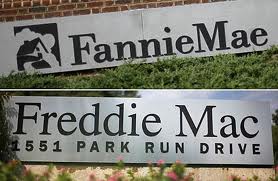Privatization of Fannie Mae and Freddie Mac, the two government-sponsored mortgage investment giants that together are carrying close to 80 percent of U.S. housing credit risk, is a step closer to reality. The words of Edward DeMarco, acting director of the Federal Housing Finance Agency (FHFA), at the National Association of Business Economics hinted towards a merger of Fannie and Freddie that could later become a single private entity.
Privatization of Fannie Mae and Freddie Mac, the two government-sponsored mortgage investment giants that together are carrying close to 80 percent of U.S. housing credit risk, is a step closer to reality. The words of Edward DeMarco, acting director of the Federal Housing Finance Agency (FHFA), at the National Association of Business Economics hinted towards a merger of Fannie and Freddie that could later become a single private entity.
DeMarco, who has been a controversial figure due to his reticence to allow mortgages guaranteed by Fannie and Freddie to be written down in an effort to alleviate the housing crisis, explained that the current proprietary securitization and guarantee systems of each entity would have to disappear. Fannie and Freddie have been under government conservatorship since 2008.
Joint Venture to Begin After 2013
The new giant guarantor is not expected to deal in mortgage-backed securities (MBS) this year. DeMarco mentioned that the board of executives could convene later in 2013, and that key staff would be hired as well this year. Another step that may take place this year is the reduction of multifamily mortgage guarantees by 10 percent. Fannie and Freddie are slated to sell $30 billion worth of MBS this year with the intent of unloading risk onto private investors.
DeMarco’s statements signaled that the joint venture plans are part of an impending transformation of the $10 trillion mortgage market in the U.S. Lawmakers and government officials have been mulling an overhaul of the home loan market over the last two years, and a few proposals are slanted towards reducing the government’s involvement in the mortgage and credit markets.
Streamlining Operations
According to DeMarco, the operational status quo of Fannie and Freddie creates a redundancy that could be consolidated by a merger. The joint venture will also reduce the current compensation plan of executive officers who are not competing for the mortgage business. Banking analysts have been paying attention to the growing profits of these firms and are concerned that they are becoming too dominant.
Although Fannie and Freddie were bailed out by taxpayers, they are not financial underperformers. Freddie Mac posted a healthy $11 billion profit last year, and the mortgage industry is waiting on Fannie Mae to release equally prosperous financial reports in March. While various institutional investors would like to be allowed to participate in the flourishing secondary mortgage market, it is not clear that they would be willing to shoulder the sheer risk that Fannie and Freddie have been shouldering for decades.




